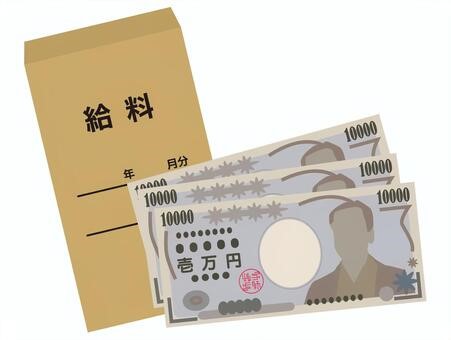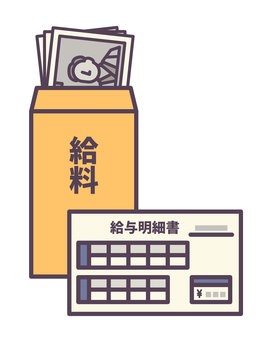Words used in Payment Slip (Kyuyo meisai)
2022.06.11

Payment Slip uses difficult Japanese words. Let’s learn about the meanings of those words!
勤怠(きんたい)Service Record
- 労働日数(ろうどうにっすう)the number of working days
- 出勤日数(しゅっきんにっすう) the number of work attendance
- 有給休暇日数(ゆうきゅうきゅうかにっすう) Paid holiday this month
- 慶弔休暇日数(けいちょうきゅうかにっすう) Other Paid Holiday this month
Keityou(慶弔) denote Keiji (慶事) and Tyouji (弔事). Keiji (慶事) means celebrations such as marriage and childbirth. You can take this holiday when you, your children, and your siblings get married or your wife gives birth. Tyouji (弔事) means condolence. When your husband, wife, children, father, mother, siblings, grandparents, partner’s parents, and siblings die, you can take this holiday. The number of this holiday depends on the depth of the relationship between you and those who get married or die.
- 欠勤日数(けっきんにっすう)the number of absence days
- 遅刻回数(ちこくかいすう)Late
Late is the number of time you were late for work in the month
- 早退回数(そうたいかいすう)Early
Late is the numer of time you came back home earlier than the specified time.
- 超勤時間(ちょうきんじかん)Overtime
支給(しきゅう) Payment

- 基本給(きほんきゅう)Base Salary
The amount of this salary is determined based on the worker’s age, academic qualification, experiences, skills, and position.
- 役職手当(やくしょくてあて) Position allowance
If you get t a position, you can get this allowance. This allowance is determined based on the position.
- 家族手当(かぞくてあて) Family Allowance
You can get this allowance if you have your husband, wife, or children.
- 残業手当(ざんぎょうてあて) Overtime Allowance
If you work more than the working time specified in the contract, you can get this allowance.
- 時間外手当(じかんがいてあて)Midnight shift allowance
If you work at midnight or early in the morning, you can get this allowance.
- 通勤手当(つうきんてあて) Commutation Allowance
The amount of this allowance is determined depending on your commuter costs.
- 総支給額(そうしきゅうがく) Gross Payment
Gross payment is the amount of money which your company actually paid.
控除(こうじょ) deduction

Deduction is the money which is deducted from your salary.
- 所得税(しょとくぜい)income tax
The cost of this tax is determined based on expected annual income. Annual income is expected based on the former year’s income.
- 住民税(じゅうみんぜい) Inhabitant Tax
You pay this tax to prefecture and municipalities. The cost of this tax is determined based on your salary.
- 健康保険料(けんこうほけんりょう) Health Insurance premium
Thanks to this insurance, you pay only 30% of medical fees.
- 介護保険料(かいごほけんりょう) Nursing care insurance premium
40-64 years old people pay this insurance premium.
- 厚生年金(こうせいねんきん)Welfare Pension Insurance Premium
You pay this insurance premium so that you can get a pension from 65 years old.
- 雇用保険(こようほけん)Unemployment Insurance Premium
You pay this insurance premium so that you can get money when you lose your job.
- 控除計(こうじょけい)Gross deduction
Gross deduction is the amount of money which is deducted from payment.
差し引き支給額(さしひきしきゅうがく)net amount paid
Net amount paid is the amount of money which subtract gross deduction from the gross payment.
- Please also refer to the following page.
Withholding Tax Statement (tax-income certificate)
https://social-b.net/baiyu/en/gensenchoshuhyoen/
How to write a resume when applying to a job
https://social-b.net/baiyu/en/resume20210927en/
Tax https://social-b.net/baiyu/en/tax0730en/
- If you have further inquiries, please feel free to ask questions from the link below.
https://social-b.net/baiyu/en/question-box/